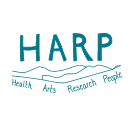this is you if: you work for a trust or foundation interested in supporting arts and health, a UK research council, or a government funder .
Key overall recomendation
➔ be strategic: develop investment programmes where the type of support you’re offering (grants, coaching, non-financial support) sets innovation projects up for long-term success at each stage, from groundwork through to scaling.
Groundwork
➔ offer development grants alongside coaching to help innovation teams build strong relationships for long-term health & arts partnerships, knowing this will reap long term benefits by building stronger foundations for complex work.
➔ intentionally support diverse collaborations that involve artists and people with lived experience in the exploration of a health challenge.
➔ test out different ways of working with grant applicants, e.g. meetings, mixed media applications, 2-stage processes, proportionate given the amount of funding on offer: do not overburden on small organisations and make sure the process is useful to everyone involved, not just your selection process.
Test
➔ offer (or enable) funding and non-financial support to research and development partnerships where ideas can be explored around a health challenge. Be flexible with milestones, timescales and participant numbers so that project teams can test, learn, fail, iterate and succeed in an overarching aim to learn about which ideas will best meet their goals (rather than growing numbers).
➔ for partnership projects with health and care organisations, confirm that enough time, resources and leadership has been committed by all partners, with senior level sponsorship in place, before agreeing to fund.
➔ build exploratory evaluation costs and coaching into 'test' stage projects.
Invest
➔ offer larger 2-3 year investments in projects at this stage so that teams can undertake proper research/evaluation (e.g. academic research-led grants), train more practitioners and build their resources to embed projects long-term and build new relationships for scaling.
➔ ensure core costs are sufficiently factored into projects at this stage, particularly communications and fundraising, so that teams can build their capacity to generate a portfolio of long-term funding sources.
➔ consider what you are trying to learn from each funding programme, provide opportunities for funded projects to support each other and generate collective learning (networking, coaching); share what you learn with other funders.
Scale
➔ fund appropriately evidenced projects on a longer-term basis so projects can grow in scale and health partners can rely on them.
➔ share and amplify the story of your funded projects, and what you’ve learned, with other funders, health and care leaders, and policy makers.

